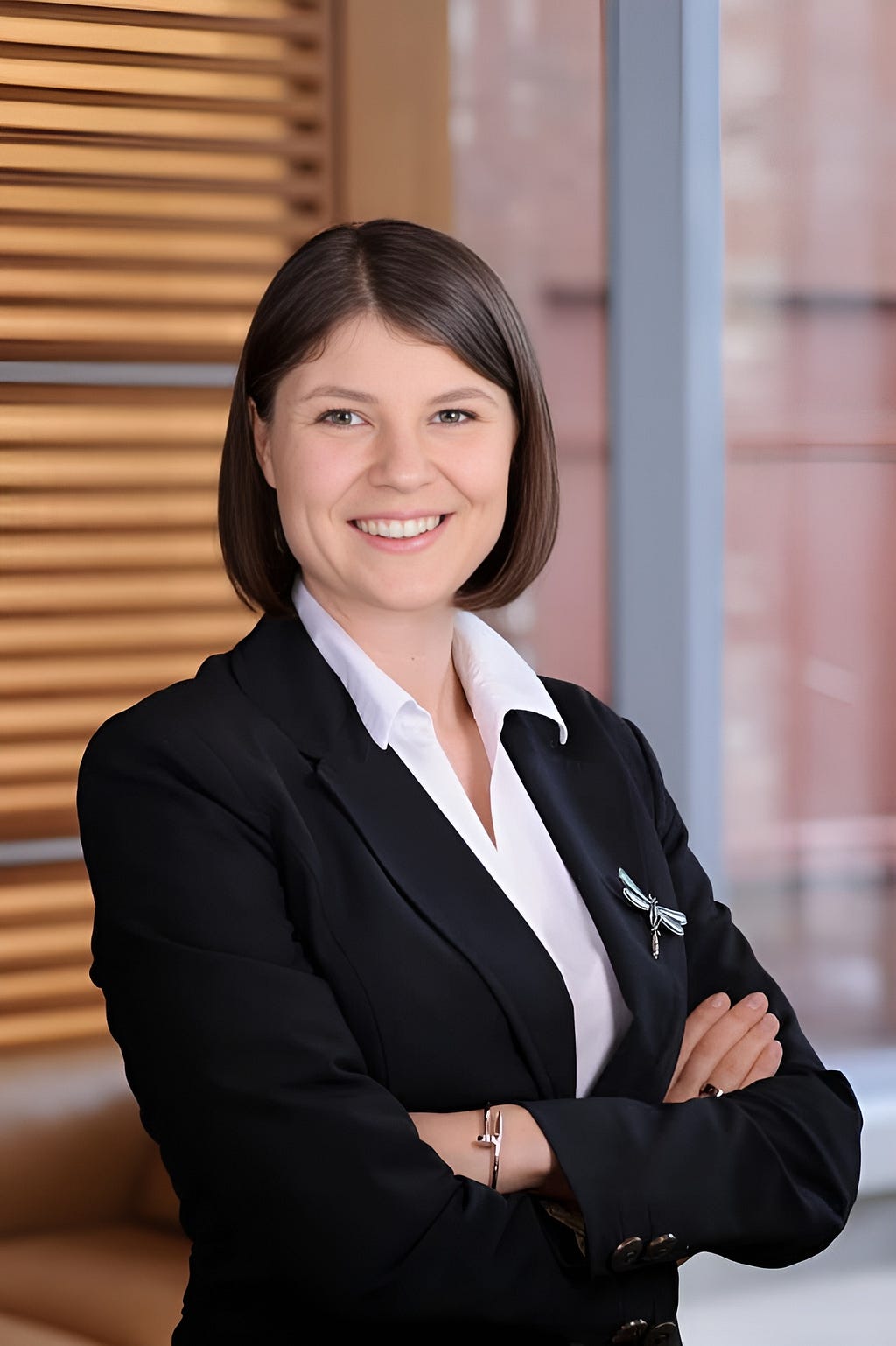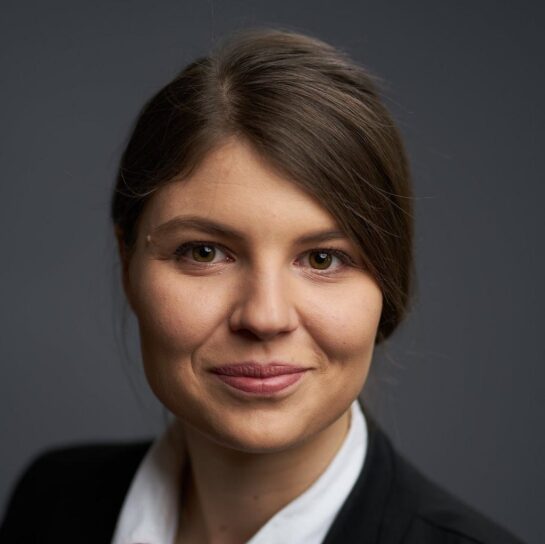Growing Every Day: Kateryna Odarchenko Of The Institute for Democracy On What We Can Do To Grow Every Day
Surround Yourself with Mentors and Peers: Having mentors and colleagues who push you to grow is essential. I’ve been fortunate to work with inspiring political leaders who have challenged me to think bigger and be bolder in my strategies.
Growth is an essential part of life, both personally and professionally. Every day presents an opportunity to learn, evolve, and become better versions of ourselves. But how do we seize these opportunities? How do successful writers, leaders, and influencers ensure they are constantly growing and improving? What daily habits, practices, or mindsets contribute to their continual growth? In this interview series, we are talking to authors, leaders, influencers, and anyone who is an authority about “What We Can Do To Grow Every Day”. As a part of this series, I had the pleasure of interviewing Kateryna Odarchenko.
Kateryna Odarchenko is a distinguished leader in international political strategy and governance. With over 500 publications and comments, her work is featured in prestigious outlets such as The Washington Post, ABC News, Fox, C-SPAN, USA Today, Yahoo News, Benzinga, GoBanking, Yahoo Finance, and MarketWatch, with a total potential audience of over 150 million. She regularly contributes to leading think tanks, including the Atlantic Council, Wilson Center, CEPA, and The Jamestown Foundation.
As the founder of the Institute for Democracy and Development PolitA, Kateryna frequently speaks and conducts lectures at universities on election campaign management, advocacy, and democratic principles. Her social media presence includes over 50,000 followers across platforms such as Facebook, LinkedIn, Instagram, X, and YouTube.
She is the organizer of the annual International Government Relations Forum and the International Campaign Management Forum, which brings together political campaign and public affairs professionals from 12 countries every year since 2013.
Kateryna is the author of The Game of Elections, a comprehensive guide that provides actionable insights for political consultants and politicians. With over 30 courses developed for American and European universities, Kateryna’s work focuses on democracy institution building and electoral oversight. As an international political consultant, she has led over 30 election victories across the U.S., Eastern Europe, and Central Asia, enhanced democratic processes, managed 50 anti-crisis campaigns, and conducted over 100 PR campaigns and personal reputation projects for political and business leaders. Her leadership in election and political communication projects spans the U.S., EU, Israel, Ukraine, Moldova, Bulgaria, Belgium, France, and Kazakhstan.
Residing in the Washington D.C. metro area with her family, Kateryna is committed to advancing democratic values and governance.
Thank you so much for your time! I know that you are a very busy person. Our readers would love to “get to know you” a bit better. Can you tell us your “Origin Story”? Can you tell us the story of how you grew up?
I grew up in Ukraine in a family that was always engaged in public service and societal improvement. My father was a political figure, and I saw firsthand the influence that strong political leadership could have on society. This inspired me from a young age to work toward creating positive change. The political landscape in Ukraine during my upbringing was often complex and fraught with challenges, which pushed me to study political science, governance, and democracy-building.
Can you tell us a bit about what you do professionally, and what brought you to this specific career path?
Today, I am a political strategist and consultant, working on the international stage. My work spans election campaign management, advocacy, and the development of democratic institutions. After studying and gaining practical experience in both Ukraine and internationally, I founded the Institute for Democracy and Development PolitA, where I educate students, politicians, and professionals on election strategies and governance.
I have been fortunate to contribute to over 30 election victories across the U.S., Europe, and Central Asia, lead PR and anti-crisis campaigns, and share my expertise with universities and political parties around the world. My passion for strengthening democracy and creating sustainable political structures has defined my career path.
A significant part of my professional development has been the annual International Forum for Political Consultants and the International Government Relations Forum, which I have organized for the past nine years. These forums bring together experts and professionals from over 12 countries, creating a space for learning, exchanging experiences, and advancing political consulting and lobbying practices globally.
Thank you for all that. Let’s now turn to the main focus of our discussion about Personal Growth. To make sure that we are all on the same page, let’s begin with a simple definition. What does “Personal Growth” mean to you?
Personal growth, to me, is the commitment to continuously improve in all aspects of life — professionally, personally, and spiritually. It means evolving with intention, learning from every challenge, and pushing boundaries to reach new heights of understanding and success. It’s about becoming better not only for oneself but also for those around you and the world at large.
Why do you believe that it’s important to commit to growing every day?
In politics, as in life, the landscape is always changing. To remain effective and relevant, it’s essential to grow continuously. By committing to daily growth, we avoid becoming stagnant and are better equipped to adapt to new challenges, whether they are personal, professional, or societal. Growth is the pathway to innovation, leadership, and resilience.
What are the key upsides for those who mindfully engage in a journey of personal evolution?
Those who invest in their personal evolution are more likely to achieve their goals, become better leaders, and inspire others. Personal growth opens doors to new opportunities, fosters stronger relationships, and creates a more profound sense of purpose. For me, it has led to a fulfilling career where I can influence democratic change globally while also growing as a person.
When we stop evolving in intentional ways, what do you think are the biggest downsides?
When we stop growing intentionally, we risk becoming disconnected from the world around us. In politics, failure to evolve can mean losing touch with the people you serve. Personally, it can lead to dissatisfaction, frustration, and a sense of being stuck. Stagnation closes the door to progress and innovation.
What specific practices, if any, do you have in place to ensure that you don’t become stagnant in life?
I stay proactive by setting new goals for myself regularly, attending international conferences, and engaging in continuous learning — whether through formal education or new professional challenges. I also mentor young professionals and students, which keeps me grounded and constantly in touch with new perspectives.

Is there any particular area of your life where you are most committed to growth (e.g., spiritually, professionally, socially, internally, relationally)?
Professionally, I am most committed to growth in the areas of political consulting and democratic governance. As the world continues to change, the methods we use to strengthen democracy must also evolve. I am constantly studying new technologies, communication strategies, and international best practices to stay at the forefront of my field.
Here is the primary question of our discussion. If you could offer five tips to readers on how to stimulate and perpetuate self-growth, what would they be? If you can, please share a story or an example for each.
1. Seek Out Challenges: Growth comes from facing challenges. For example, when I took on my first major international election campaign, I had to learn new cultural dynamics and campaign strategies, which expanded my understanding of global politics.
2. Learn Continuously: Never stop learning. Whether it’s formal education, reading, or attending conferences, staying informed is crucial. I’ve read many influential books, such as The Game of Elections, which I wrote to reflect on the complexities of political campaigns.
3. Set Clear Goals: Always set short-term and long-term goals. In my work, I set clear objectives for each campaign I manage, ensuring measurable success and personal fulfillment.
4. Surround Yourself with Mentors and Peers: Having mentors and colleagues who push you to grow is essential. I’ve been fortunate to work with inspiring political leaders who have challenged me to think bigger and be bolder in my strategies.
5. Reflect Regularly: Take time to reflect on your successes and failures. I make it a point to analyze every campaign I lead, understanding what worked and what didn’t, and using that knowledge for future growth.
What advice would you give to someone who feels stuck and unsure of how to start their personal growth journey?
If you feel stuck, start by taking small steps toward change. It could be setting a new personal goal, seeking advice from a mentor, or learning a new skill. Growth doesn’t have to happen overnight — it’s the consistent, intentional actions that lead to long-term success.
Are there any books, podcasts, or other resources that have significantly contributed to your personal growth?
Some of the resources that have helped shape my personal and professional growth include:
• Books on Behavioral Economics and Neuromarketing — These offer insights into human decision-making and influence, which are crucial in political campaigns.
• Books on Political Communications — Titles like The Political Brain by Drew Westen and The Rhetorical Presidency by Jeffrey Tulis have influenced my understanding of messaging and voter psychology.
• Books on Archetypes — Christopher Vogler’s The Writer’s Journey and Margaret Mark & Carol Pearson’s The Hero and the Outlaw have been instrumental in helping me understand the power of storytelling and archetypes in communication and branding.
• TED Talks and podcasts on leadership and innovation.
• Conferences hosted by institutions like the Atlantic Council and Wilson Center, where I’ve engaged with global political thought leaders.
You are a person of great influence. If you could start a movement that would bring the most amount of good to the most amount of people, what would that be? You never know what your idea can trigger. 🙂
A vital aspect of my personal and spiritual growth is the study of the Torah and the observance of Shabbat. These practices provide me with a sense of grounding and clarity, especially in my work as a political consultant and educator. The Torah offers timeless wisdom that applies not only to spiritual matters but also to leadership, ethics, and decision-making.
Observing Shabbat, in particular, allows me to step back from the fast-paced world of politics and focus on what truly matters: family, reflection, and personal renewal. It’s a day where I can disconnect from the constant demands of my work and connect more deeply with my faith, gaining insight and balance for the week ahead.
How can our readers further follow your work online?
You can follow me on LinkedIn, Instagram, and YouTube, where I regularly share updates about my projects, publications, and educational initiatives:
• LinkedIn: linkedin.com/in/katerynaodarchenko
• Instagram: instagram.com/kodarchenko
• YouTube: youtube.com/@SICGROUP
• Facebook: facebook.com/katerina.odarchenko
• TikTok: tiktok.com/@katerynaodarchenko
Thank you so much for sharing these important insights. We wish you continued success and good health!
Growing Every Day: Kateryna Odarchenko Of The Institute for Democracy On What We Can Do To Grow… was originally published in Authority Magazine on Medium, where people are continuing the conversation by highlighting and responding to this story.
